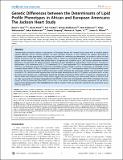| dc.contributor.author | Deo, Rahul Chandrakant | |
| dc.contributor.author | Reich, David Emil | |
| dc.contributor.author | Tandon, Arti | |
| dc.contributor.author | Akylbekova, Ermeg | |
| dc.contributor.author | Patterson, Nick | |
| dc.contributor.author | Waliszewska, Alicja | |
| dc.contributor.author | Kathiresan, Sekar | |
| dc.contributor.author | Sarpong, Daniel | |
| dc.contributor.author | Taylor, Herman A., Jr. | |
| dc.contributor.author | Wilson, James G. | |
| dc.date.accessioned | 2011-03-25T19:45:21Z | |
| dc.date.issued | 2009 | |
| dc.identifier.citation | Deo, Rahul Chandrakant, David Emil Reich, Arti Tandon, Ermeg Akylbekova, Nick Patterson, Alicja Waliszewska, Sekar Kathiresan, Daniel Sarpong, Herman A. Taylor Jr., and James G. Wilson. 2009. Genetic differences between the determinants of lipid profile phenotypes in African and European Americans: The Jackson Heart Study. PLoS Genetics 5(1): e1000342. | en_US |
| dc.identifier.issn | 1553-7390 | en_US |
| dc.identifier.uri | http://nrs.harvard.edu/urn-3:HUL.InstRepos:4774137 | |
| dc.description.abstract | Genome-wide association analysis in populations of European descent has recently found more than a hundred genetic variants affecting risk for common disease. An open question, however, is how relevant the variants discovered in Europeans are to other populations. To address this problem for cardiovascular phenotypes, we studied a cohort of 4,464 African Americans from the Jackson Heart Study (JHS), in whom we genotyped both a panel of 12 recently discovered genetic variants known to predict lipid profile levels in Europeans and a panel of up to 1,447 ancestry informative markers allowing us to determine the African ancestry proportion of each individual at each position in the genome. Focusing on lipid profiles—HDL-cholesterol (HDL-C), LDL-cholesterol (LDL-C), and triglycerides (TG)—we identified the lipoprotein lipase (LPL) locus as harboring variants that account for interethnic variation in HDL-C and TG. In particular, we identified a novel common variant within LPL that is strongly associated with TG (p = 2.7×10−6) and explains nearly 1% of the variability in this phenotype, the most of any variant in African Americans to date. Strikingly, the extensively studied “gain-of-function” S447X mutation at LPL, which has been hypothesized to be the major determinant of the LPL-TG genetic association and is in trials for human gene therapy, has a significantly diminished strength of biological effect when it is found on a background of African rather than European ancestry. These results suggest that there are other, yet undiscovered variants at the locus that are truly causal (and are in linkage disequilibrium with S447X) or that work synergistically with S447X to modulate TG levels. Finally, we find systematically lower effect sizes for the 12 risk variants discovered in European populations on the African local ancestry background in JHS, highlighting the need for caution in the use of genetic variants for risk assessment across different populations. | en_US |
| dc.language.iso | en_US | en_US |
| dc.publisher | Public Library of Science | en_US |
| dc.relation.isversionof | doi:10.1371/journal.pgen.1000342 | en_US |
| dc.relation.hasversion | http://www.ncbi.nlm.nih.gov/pmc/articles/PMC2613537/pdf/ | en_US |
| dash.license | LAA | |
| dc.subject | genetics and genomics | en_US |
| dc.subject | cardiovascular disorders | en_US |
| dc.subject | coronary artery disease | en_US |
| dc.title | Genetic Differences between the Determinants of Lipid Profile Phenotypes in African and European Americans: The Jackson Heart Study | en_US |
| dc.type | Journal Article | en_US |
| dc.description.version | Version of Record | en_US |
| dc.relation.journal | PLoS Genetics | en_US |
| dash.depositing.author | Deo, Rahul Chandrakant | |
| dc.date.available | 2011-03-25T19:45:21Z | |
| dash.affiliation.other | HMS^Medicine-Massachusetts General Hospital | en_US |
| dash.affiliation.other | HMS^Genetics | en_US |
| dash.affiliation.other | HMS^Genetics | en_US |
| dc.identifier.doi | 10.1371/journal.pgen.1000342 | * |
| dash.contributor.affiliated | Deo, Rahul Chandrakant | |
| dash.contributor.affiliated | Tandon, Arti | |
| dash.contributor.affiliated | Reich, David | |


